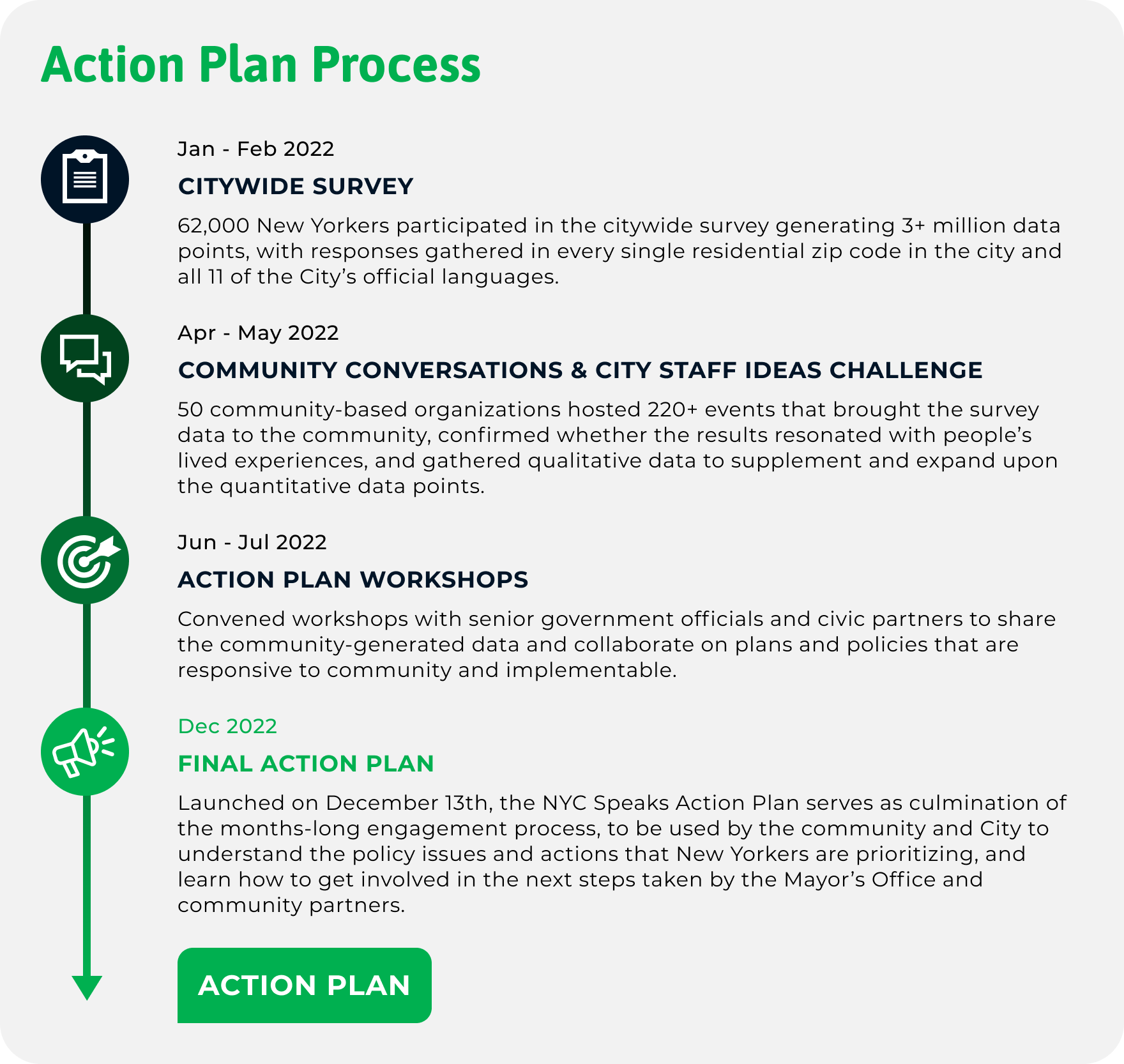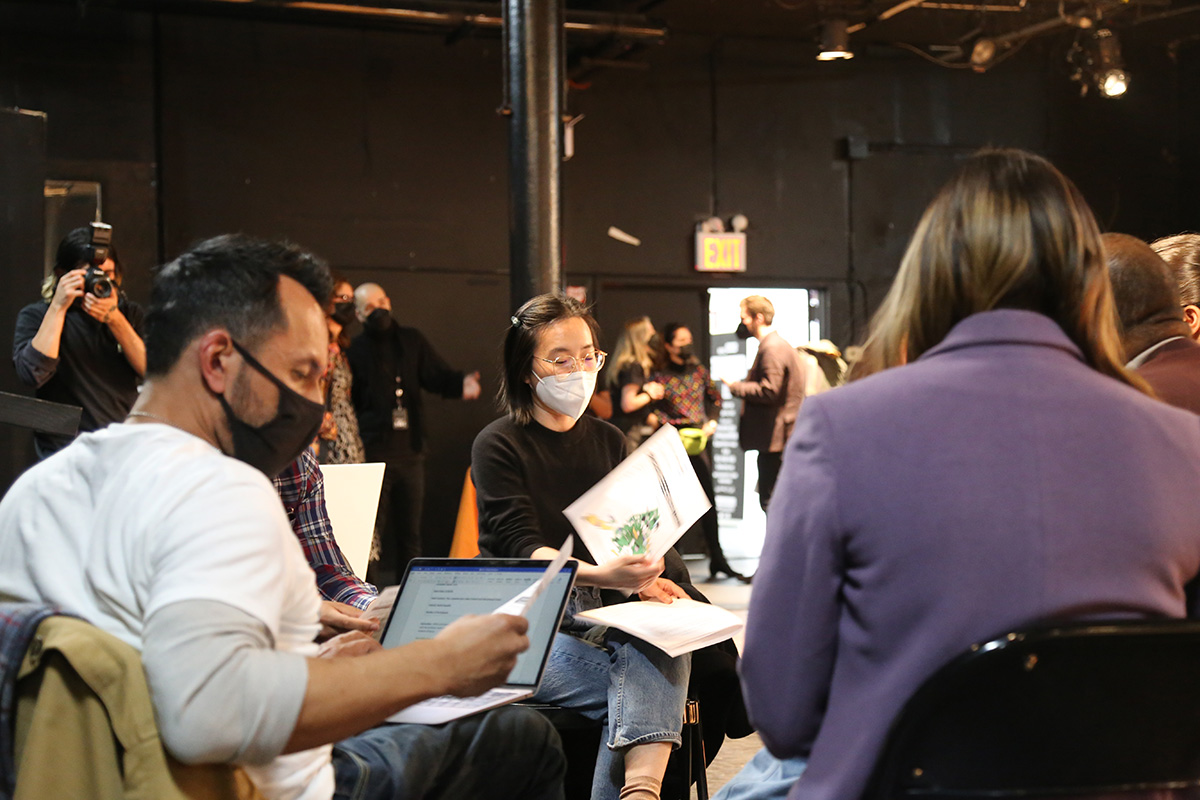
Our Methodology
NYC Speaks was designed to amplify the voices of New Yorkers
NYC Speaks has been designed to amplify the voices of New Yorkers on critical policy issues by using a unique “inside-outside” methodology that simultaneously engages three key stakeholder groups—the community, the mayoral administration, and civic institutions—to answer our primary research question: what are the most strategic policy actions that respond to residents’ biggest priorities?
Our process is to conduct a rigorous, data-driven assessment of priority issues and policy actions for a statistically representative sample of residents while conducting a parallel “bottom up” assessment of policy priorities for people inside of city government (from entry-level city employees to senior leaders) and powerful philanthropic and civic institutions.
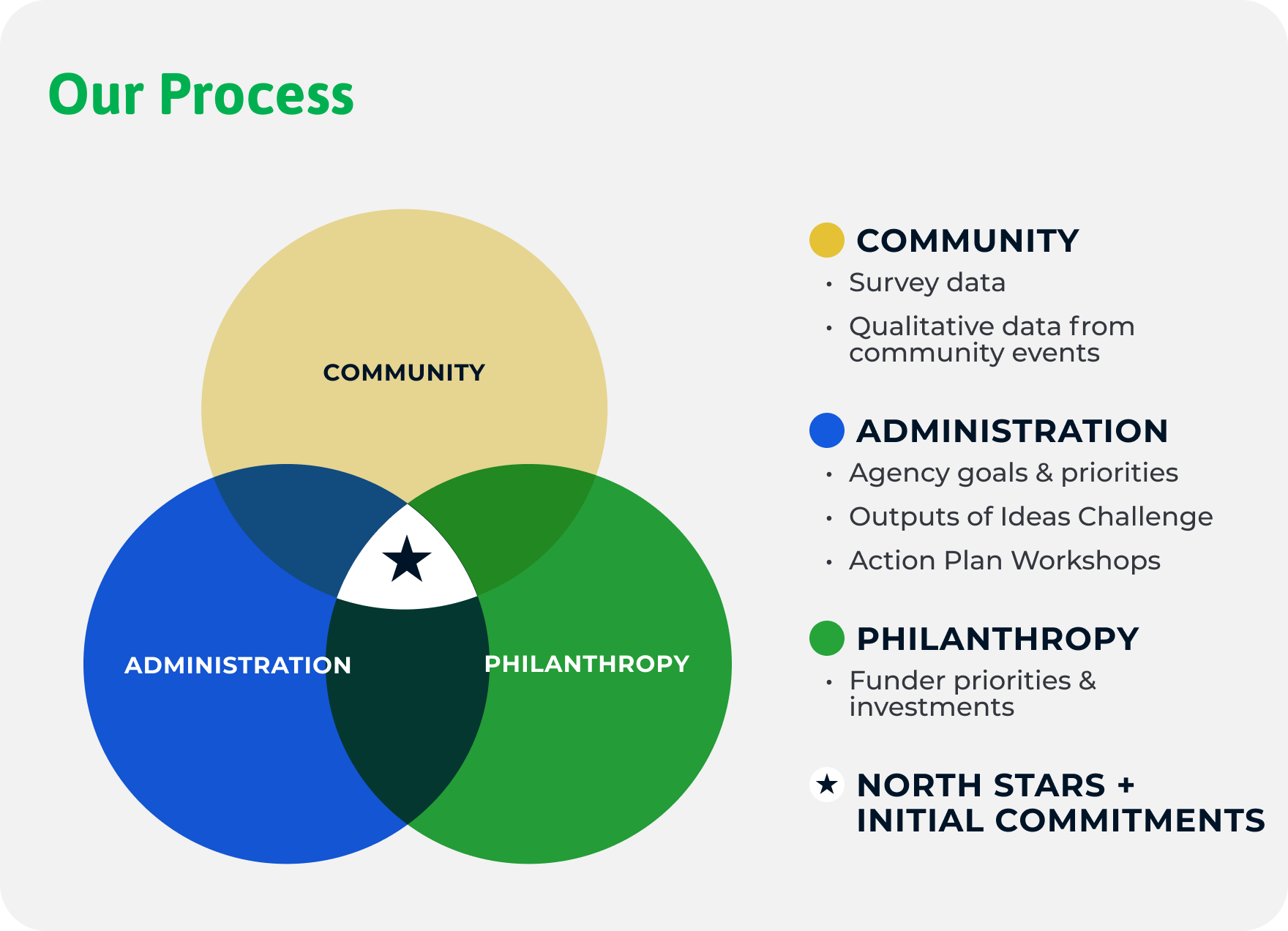
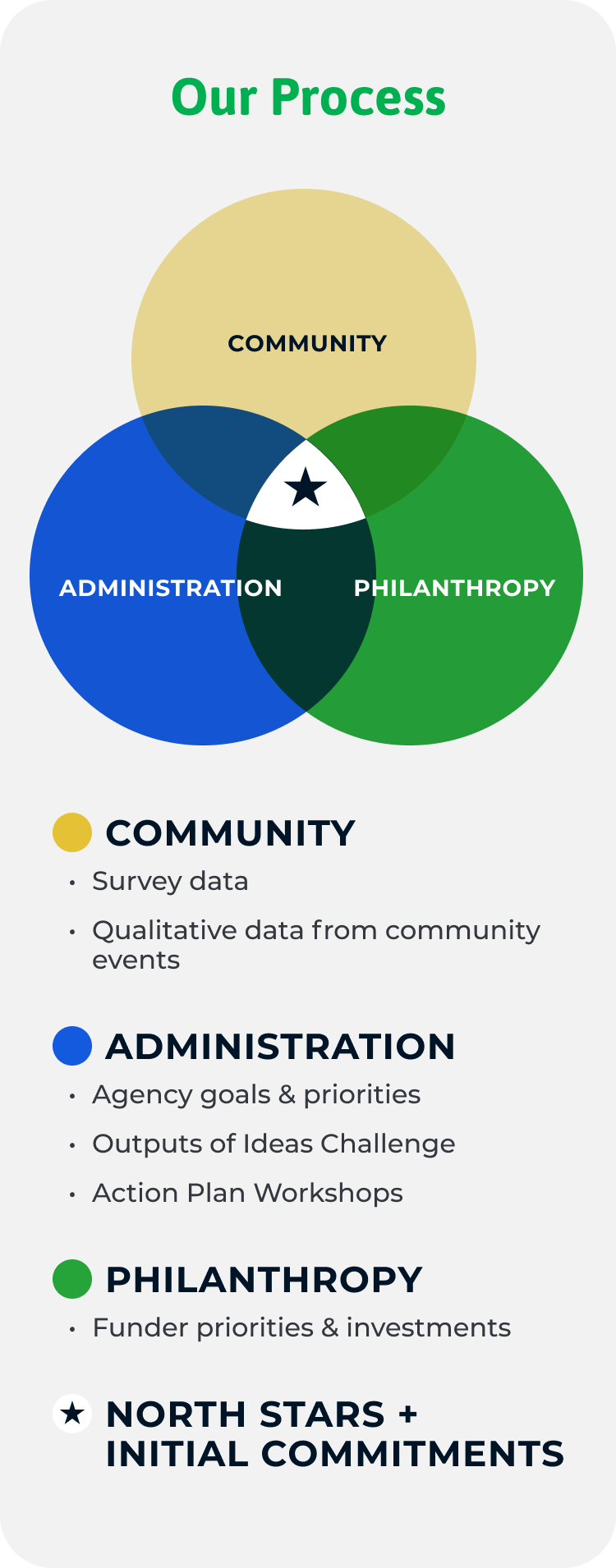
We analyzed:
- community-generated data
- administration plans and priorities
- philanthropic focus areas
From these inputs, we identified the policy priorities that are ‘at the center of the Venn diagram’ and brought together knowledgeable people inside and outside city government to craft implementable policy actions that are responsive to those priorities.
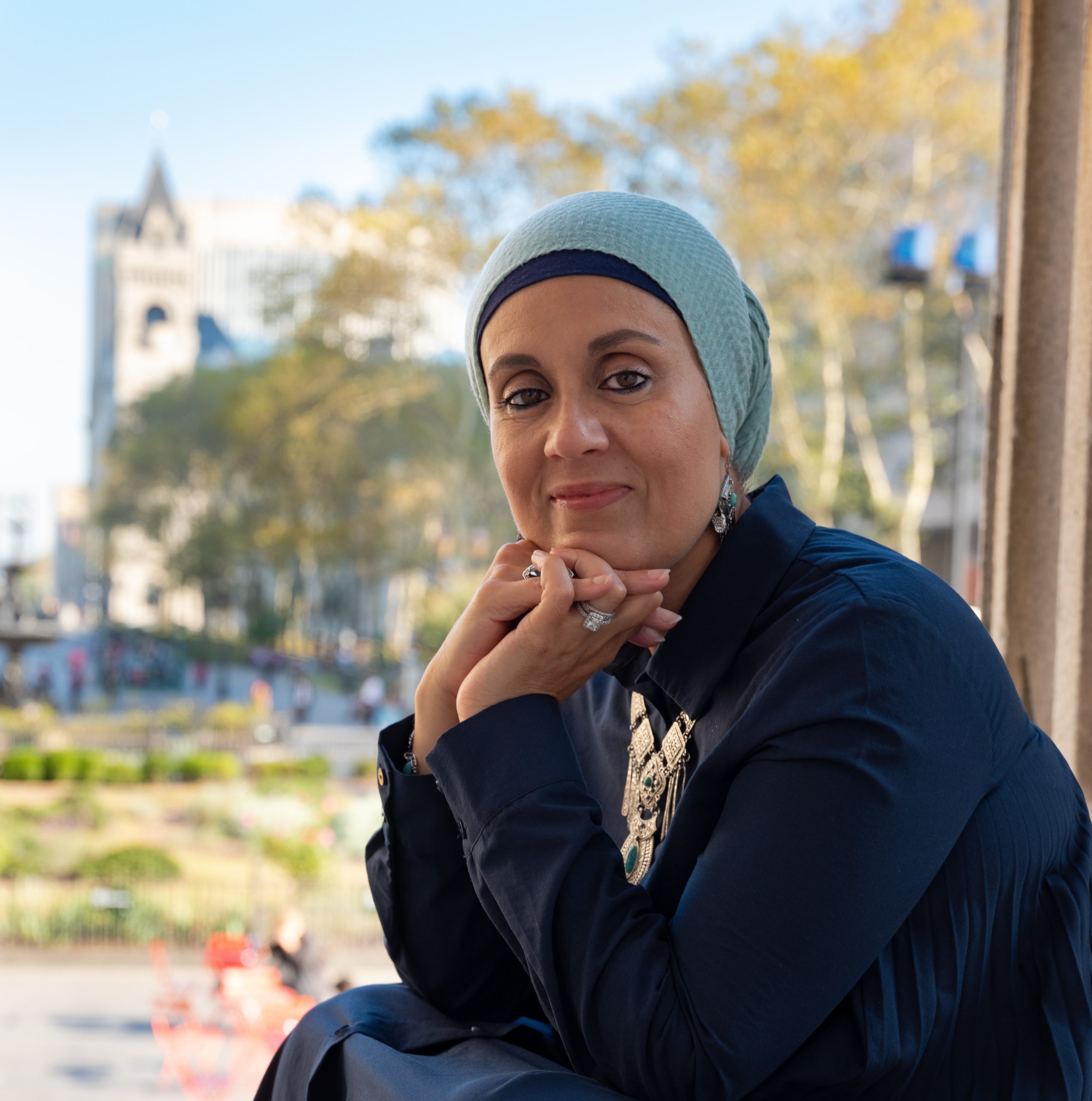
“With over a million Muslims living in NYC, it is essential that our voice is included in the conversation. The discussions that I attended were powerful and uplifting. Some of the organizations provided translations or ensured that people directly within the community were able to speak on their own experiences. I also appreciated that NYC Speaks utilized a multifaceted means of getting the word out. This initiative was driven by connecting to what the public really needs. It was incredibly unique and authentic.”
The components of our process in NYC includes the following activities:
Citywide Survey
We asked for New Yorkers’ input on 27 high-impact policy questions across 10 issue areas: health & well-being, arts & culture, housing & neighborhoods, economy & workforce, racial equity, climate & infrastructure, education & youth development, public safety, gender justice, and civic engagement. The survey also captured the voices of vulnerable populations, such as those living in public housing, those experiencing homelessness, previously incarcerated individuals, and members of the disabled community.
The goal of the survey was to amplify the voices of New Yorkers on issues that impact them most directly, especially New Yorkers typically excluded from government decision-making: Black and brown, low-income, immigrant, youth, NYCHA and disabled communities. During our survey outreach process, we worked with 150 on-the-ground canvassers in partnership with 18 community-based organizations to target 33 priority neighborhoods as identified by NYC Taskforce on Racial Inclusion & Equity (TRIE). The TRIE communities, which include communities with a high proportion of health and socioeconomic disparities and consequently those hardest hit by COVID-19, were the focus of our outreach efforts throughout the process. NYC’s Public Engagement Unit (PEU) assisted these outreach efforts through textbanking sessions targeting respondents in zip codes with low survey response rates. NYCHA residents were engaged with the support of NYCHA by linking the survey onto their website and on their newsletter, and assisting seniors across all 17 NYCHA campuses in completing their survey.
The survey received responses in all eleven languages available and across every residential zip code in the city, capturing the views and perspectives of more than 62,000 New Yorkers. With more than three million data points, the NYC Speaks survey is the largest policy survey in New York City history. The NYC Department of Education (NYC DOE) adapted the survey for high school students and promoted it in classrooms across the city, contributing 18,400 of the total responses.
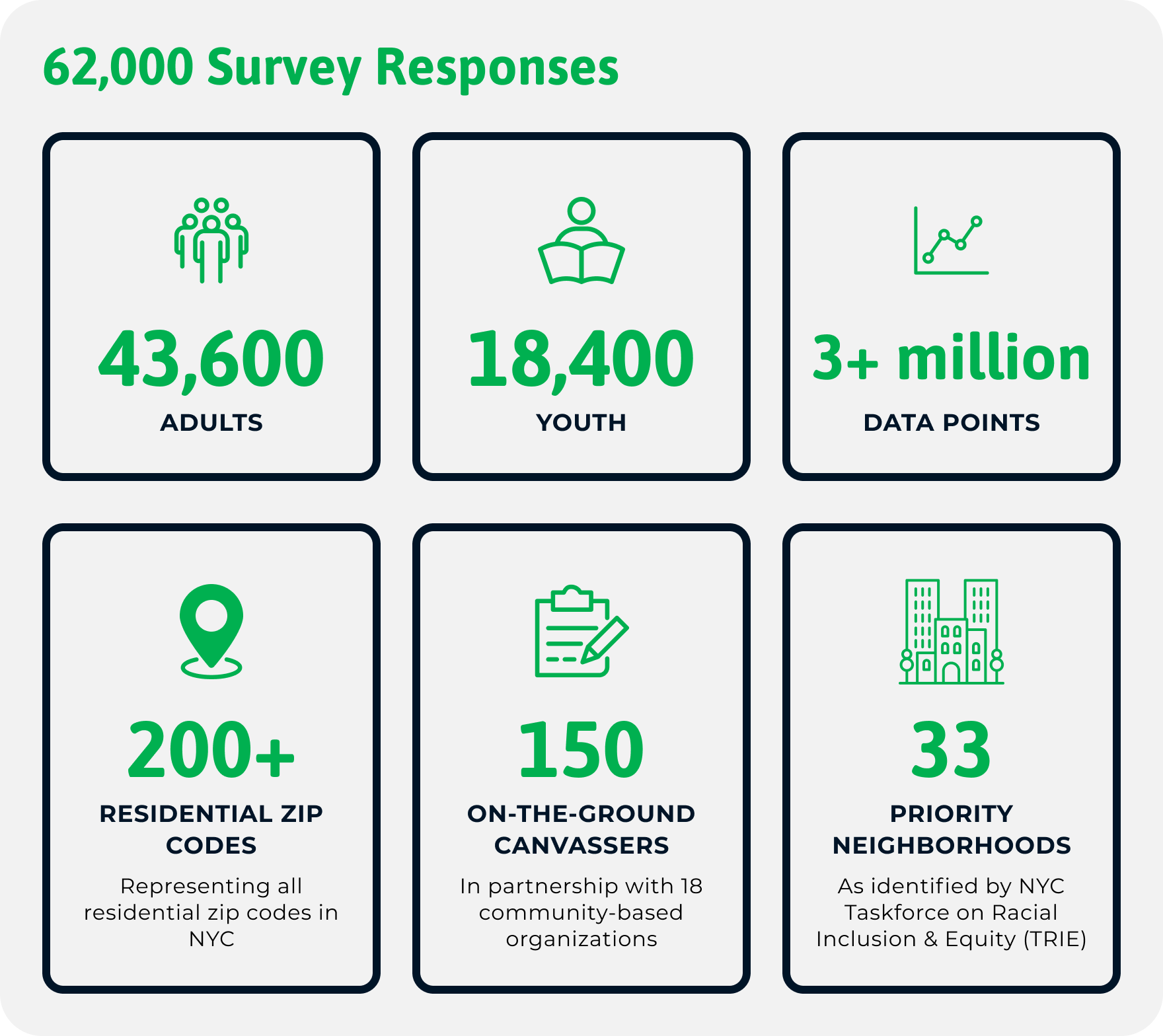

Survey Development
This survey was designed for New Yorkers, by New Yorkers. Our 80+ member Civic Policy Council–made up of individuals passionate about our city, from restaurant owners to artists, religious leaders, teachers, activists, hospital workers, and more—helped to develop research questions, refine the survey instrument, and distribute the survey through their networks. The survey was further informed by the expertise of our philanthropic partners and review of the new administration’s stated priorities. We asked for New Yorkers’ input on 27 high-impact policy questions across 10 issue areas: health & well-being, arts & culture, housing & neighborhoods, economy & workforce, racial equity, climate & infrastructure, education & youth development, public safety, gender justice, and civic engagement. The DOE led the adaption of the survey questions into a NYC Youth Speaks version to ensure that the Youth were also included in these efforts.
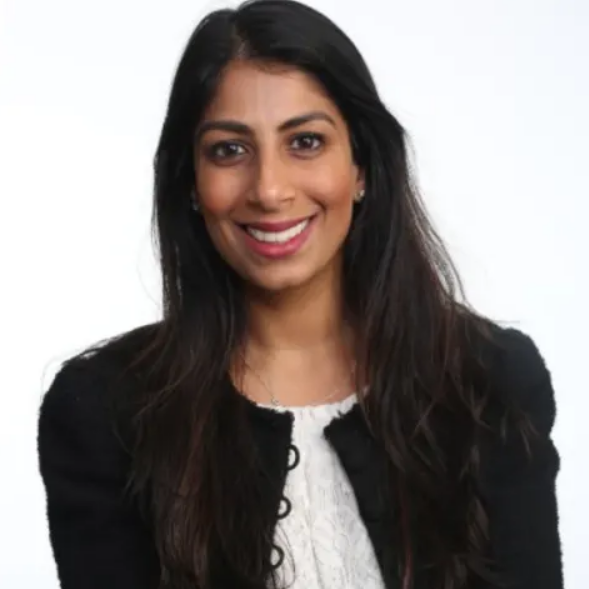
“New Yorkers want to use their voices to enact meaningful change, but they lack the platform to do so. When I began working on NYC Speaks, our initial projection for the survey was to receive around 30,000 responses. The responses doubled our expectations, which clearly portrays the true value of this initiative. A large portion of my role was to transform what my council perceived to be the largest issues that New Yorkers are currently facing in respect to equity and racial justice. The structure of NYC Speaks ensured that no voice went unheard, by backing the data with real dialogue and reflection from the general public.”
Survey Implementation & Outreach
All along, NYC Speaks focused on driving participation in communities that are too often left out of decision-making processes and disproportionately shaped by disparities. Our outreach efforts included deploying more than 150 on-the-ground canvassers in partnership with 18 community-based organizations throughout the 33 priority neighborhoods identified by the City’s Taskforce on Racial Inclusion and Equity.
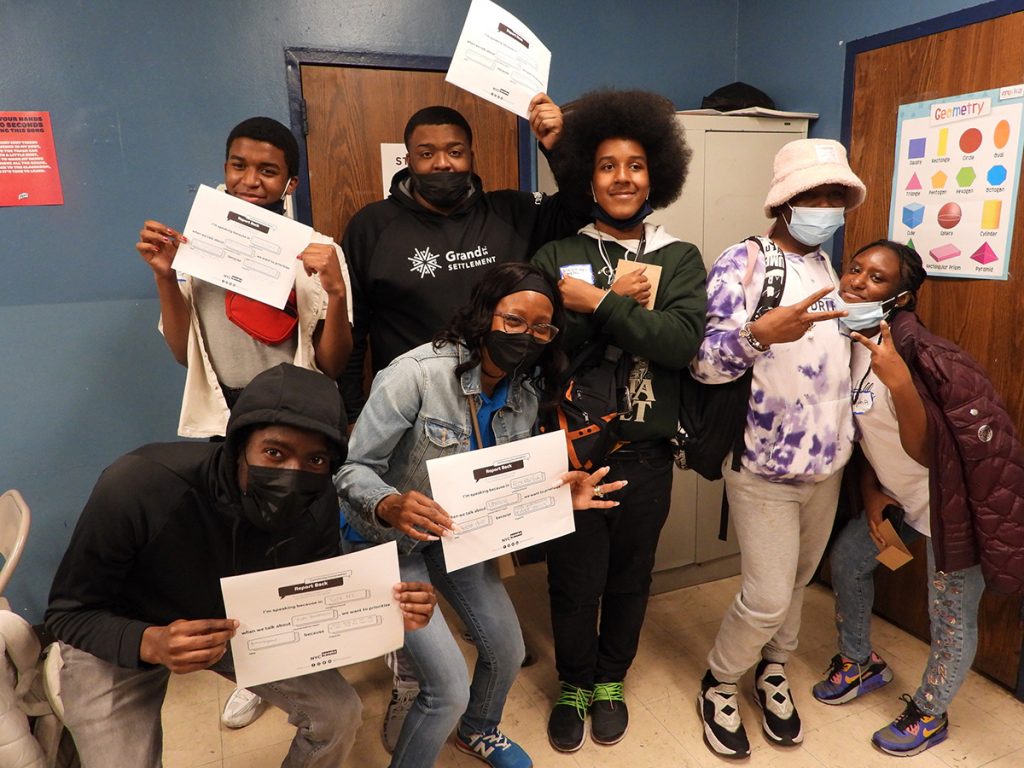
Agency outreach was also instrumental in reaching a diverse sample, with support from: the Department of Education (DOE), New York City Housing Authority (NYCHA), Department of Veterans Services (DVS), Department of Probation (DOP), the Mayor’s Public Engagement Unit (PEU), the Community Affairs Unit, The Civic Engagement Commission/DemocracyNYC (CEC/DNYC), Mayor’s Office of Immigrant Affairs (MOIA), Mayor’s Office for Community and Ethnic Media, Mayor’s Office of Operations, Department for the Aging, Department of Citywide Administrative Services (DCAS), NYC Service, Administration for Children’s Services (ACS), the Racial Justice Commission, and the Taxi and Limousine Service.
Notable civic organizations and anchor institutions that were further engaged include the NAACP, New York Public Library, Brooklyn Public Library, and Queens Public Library, Human Services Coalition, FPWA, CUNY Student Senate, 32BJ, DC37, 1199, and NYSNA.
Survey Representation
The NYC Speaks survey reached a diverse and representative selection of New Yorkers: The survey received responses in all 11 of the City’s official languages and across every residential zip code in the city. 27% of respondents were Black, 14% were Asian, and 29% were Hispanic, in line with respective shares of the population overall. Every age group above 18 and every income bracket responded to the adult survey. The survey also captured the voices of vulnerable populations, such as those living in public housing, those experiencing homelessness, previously incarcerated individuals, and members of the disabled community.
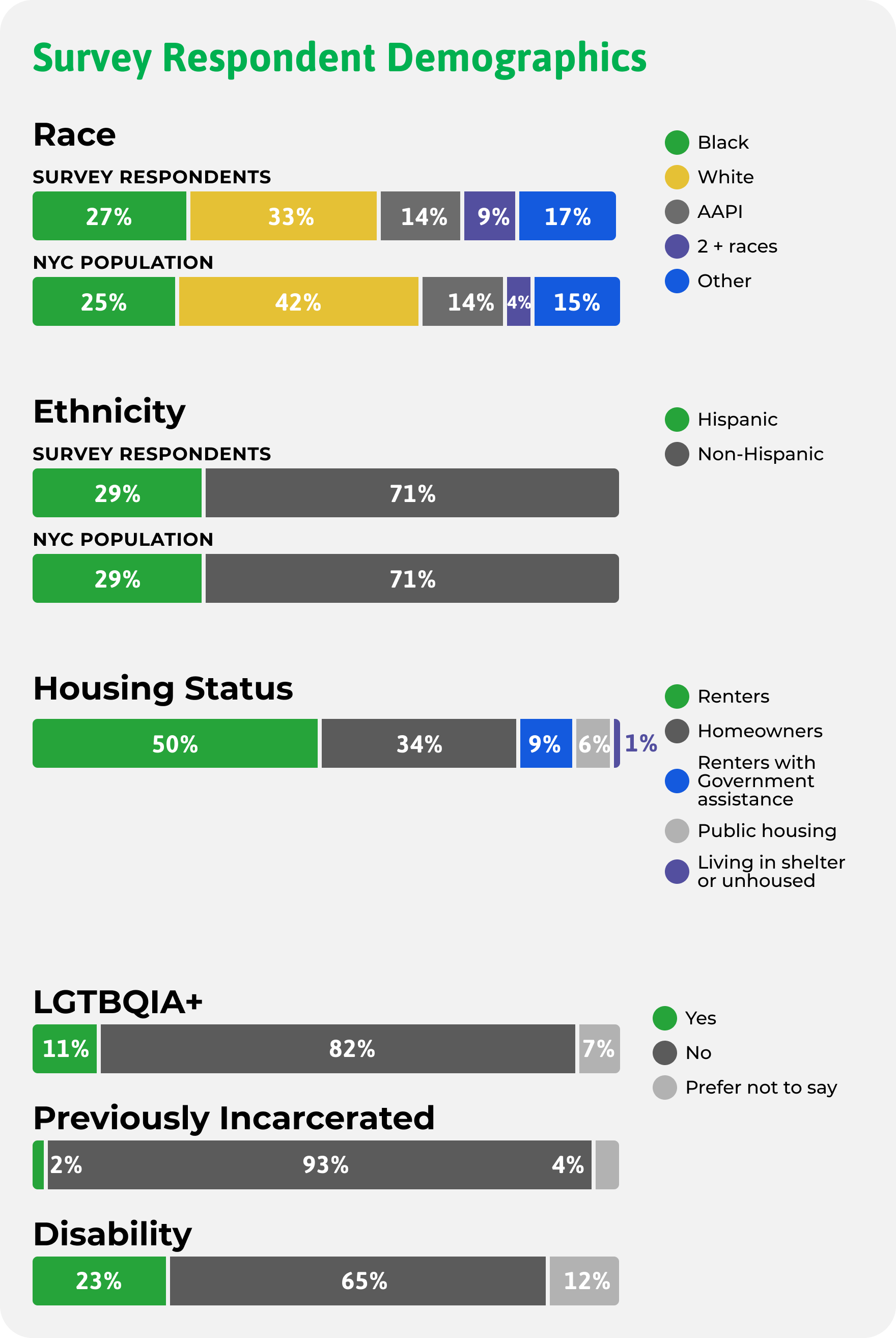

Community Conversations
NYC Speaks Community Conversations brought the survey data back to communities to interpret and reflect upon. They offered an additional opportunity to dig into the issues New Yorkers told us they cared about most. We asked: Does this approach make sense to you? How else might you approach it? What ideas would you prioritize? NYC Speaks coded over 1,000 community insights submitted by event hosts by themes based on prioritization and frequency to determine priorities across all Community Conversations. More than 4,800 New Yorkers participated in over 220 Community Conversation events online and in-person across the city in April and May 2022. They were hosted in each borough, convened in 8 languages, and served populations that have historically been marginalized, such as Black and Brown residents, seniors, those impacted by the criminal justice system, people with disabilities, women, and the LGBTQIA+ population.
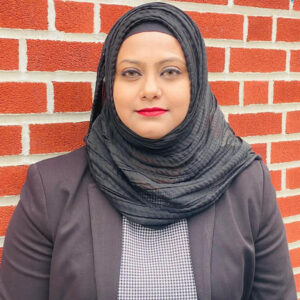
“Immigrant communities tend to lack information on city government and resources. Many members of immigrant communities are limited English Proficient, are not technologically savvy and don’t know where or how to find the information and resources about city programs and services. APNA Brooklyn Community Center was able to join efforts with NYC Speaks and host multiple conversations with several non-English speakers in Urdu. It provided them an opportunity to learn about city services and get civically more engaged. The conversations were highly important for the participants, their families, and the immigrant community at large, and I continue to receive requests to host more.”
To ensure New Yorkers across the City participated in Community Conversations, NYC Speaks partnered with the New York Public Library, Brooklyn Public Library, Queens Public Library, and YMCA to host 22 conversations facilitated by City staff from the Public Engagement Unit; engaged 250+ NYCHA residents in 9 Community Conversations across all 5 boroughs; listened to 385 high schoolers through 44 Community Conversations organized by the NYC Department of Education and 37 NYC Youth Speaks Ambassadors; and empowered 13 NYC Speaks Youth Ambassadors to facilitate a Community Conversation with the Mayor. In partnership with the NYC Civic Engagement Commission, the Clemente Soto Vélez Cultural & Educational Center, and the Department of Probation’s NeON Arts, NYC Speaks also hosted the People’s Conversation discussing arts, culture, and civic engagement in NYC and hosted community conversations with justice-involved youth at the Crossroads Juvenile Detention Center and the Department of Probation’s NeON Center in Jamaica, Queens. The conversation toolkit was also available online and residents were encouraged to host their own conversations.
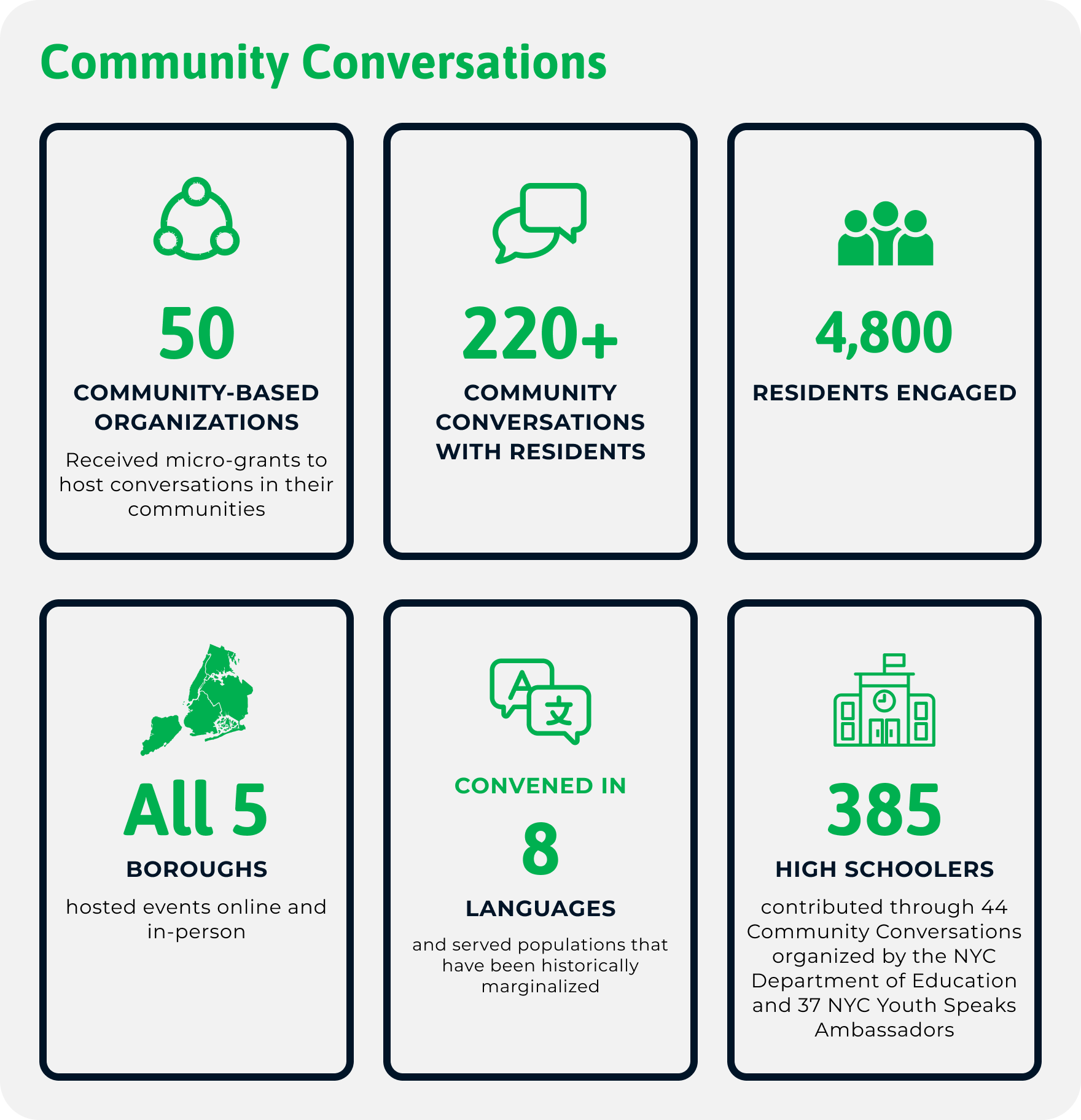

Ideas Challenge
As employees, the city’s 300K+ municipal workforce has unique expertise on how our government can help our communities thrive. NYC Speaks, in partnership with the Civic Engagement Commission, maintained a live “ideas board” using the City’s Participatory Budgeting site. City workers were invited to share their ideas for bold actions the Mayor can take to improve the lives of NYC residents in the 10 policy areas included in the survey. The ideas board allowed users to comment on ideas from their coworkers and up-vote the ideas they most agree with. The NYC Speaks City Staff Ideas Challenge captured over 450 ideas and 5,600 engagements.
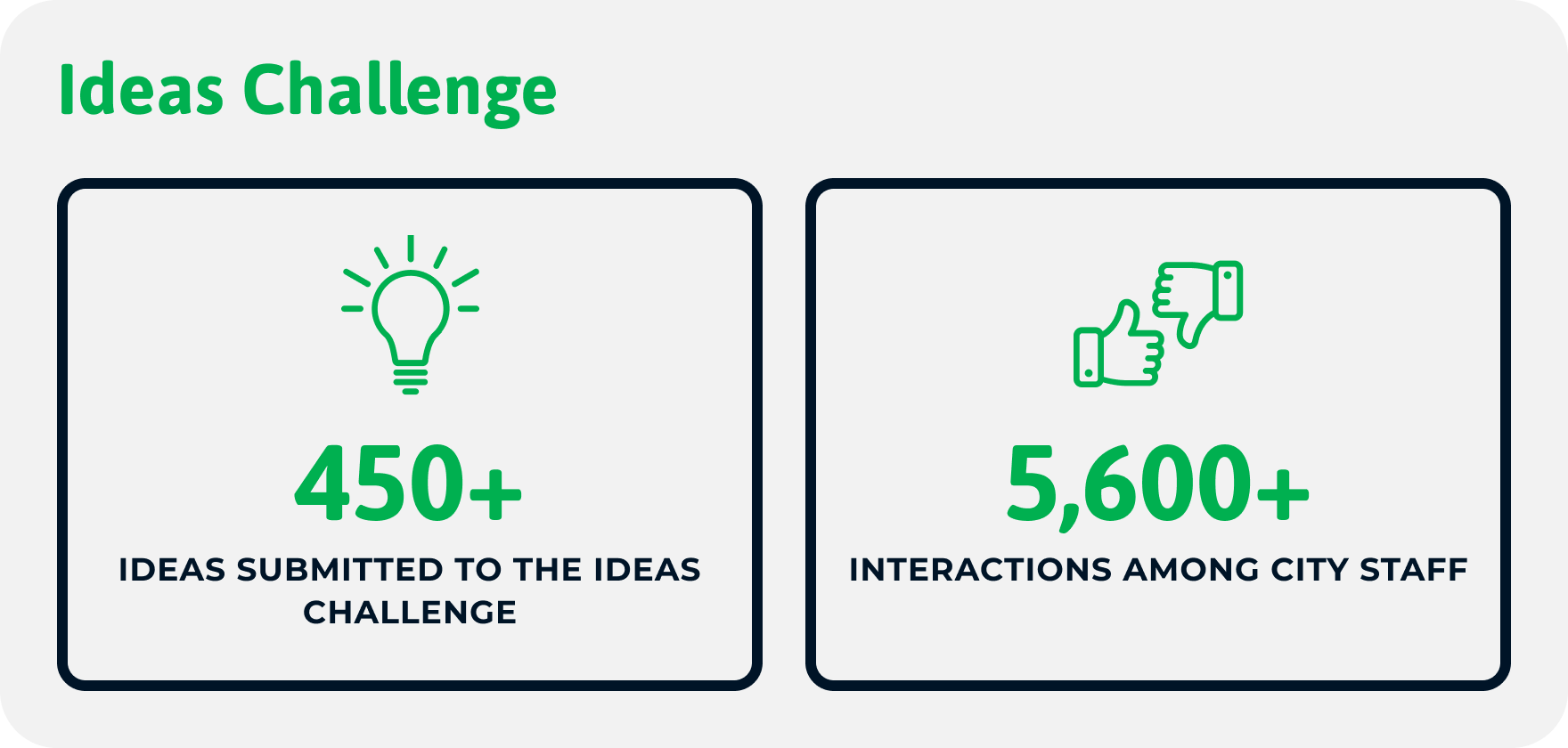
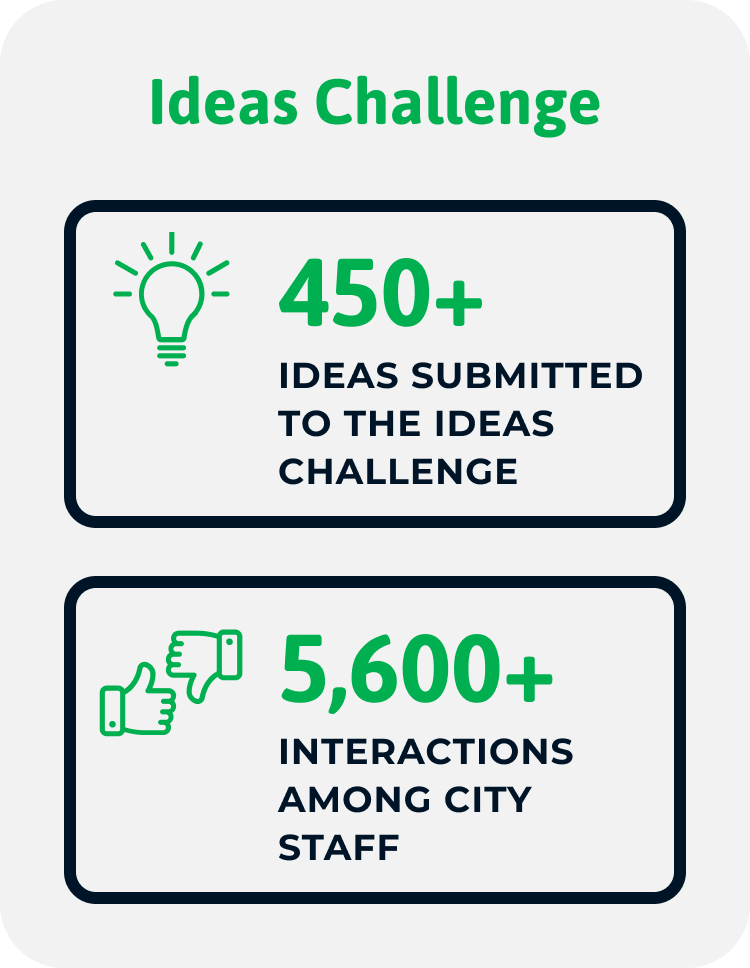
City Agency Engagement
The rigor of the community-generated data above served as a center of gravity for bringing senior government officials to the table to solve the problems New Yorkers told us they cared about most. Throughout the process, we identified internal champions within City Hall to incorporate community voice into their key policy agendas. Through Action Plan Workshops, we invited a curated group of senior government leaders, non-profit service providers, activists, academics, and philanthropists to collaborate on policies that are responsive to community and implementable. Through these workshops, we were able to bring the community-gathered data to the table, brainstorm frameworks to address the issues raised through the civic engagement process, and co-create solutions that have the potential to inform upcoming administration plans, community programming, advocacy, and legislative agendas.
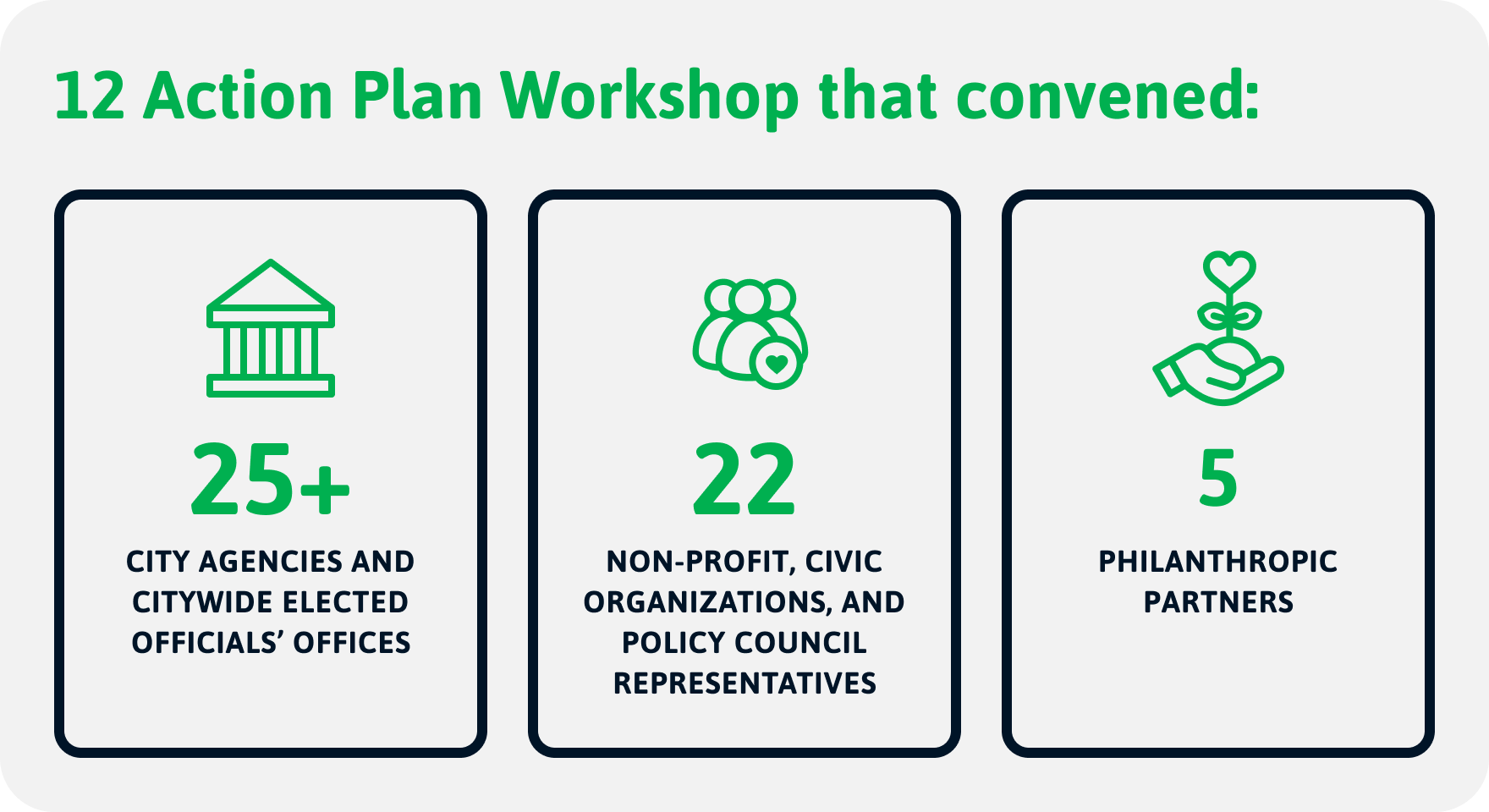
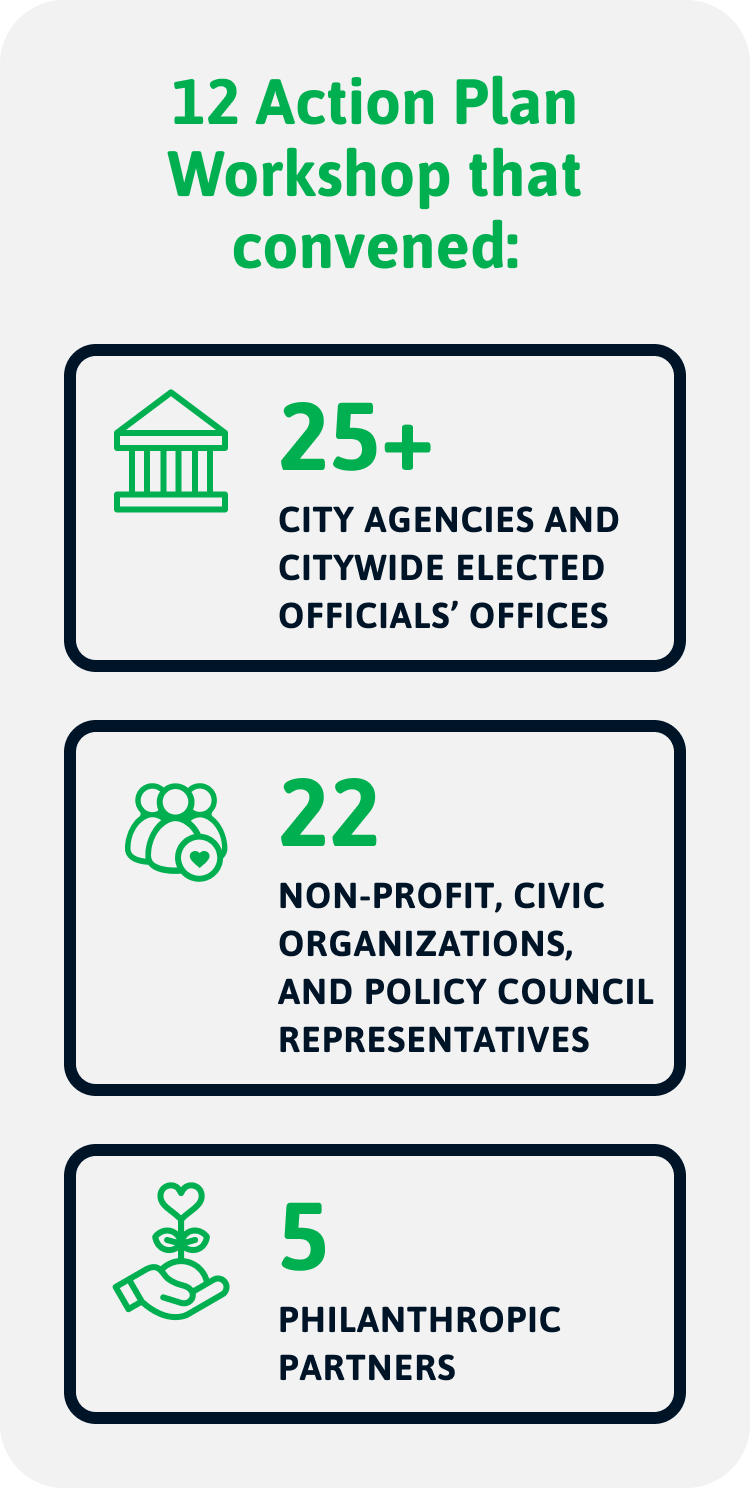
NYC Philanthropy Engagement
In April 2022, NYC Speaks hosted a panel with Philanthropy New York, a community of roughly 300 grantmaking organizations, that featured NYC Speaks funders in conversation with Deputy Mayor Sheena Wright to discuss opportunities for advancing co-governance and collaborative policymaking under the Adams administration. We’ve further engaged the Asset Funders Network (AFN) in similar conversations to inspire more collaborative and aligned grantmaking among regional AFN partners, responsive to community priorities.
